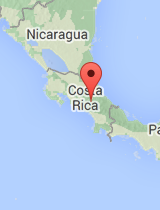Medical Summary
The health risk information presented here is summarized from Shoreland Travax®, a decision-support tool used by health care providers to perform a detailed health risk analysis based on specific locations, individual travel styles, and traveler risk behaviors. Travax provides practitioners current, independently researched malaria risk and prevention recommendations in a map-based format that goes beyond the annual WHO and US CDC statements included here. Not included here are current reports from Travax of disease outbreaks or environmental events that may pose elevated risks to travelers’ health and safety. The Providers section of this site offers a directory of health care providers who utilize Shoreland Travax for travel health counseling. Learn more about the detailed reports and maps available from these practitioners (includes links to samples).
General Information
Costa Rica is a developing nation classified as upper middle income. Located in Central America between the Caribbean Sea and the Pacific Ocean (south of Nicaragua and north of Panama), the climate classifications range from humid equatorial (long dry season) in the west to humid equatorial (no dry season) in the northeast.
Vaccinations
Routine vaccinations are essential due to a persistent global rise of vaccine-preventable diseases (especially markedly high rates of diphtheria, pertussis, and measles). Prior to travel, travelers should be up-to-date with the age-appropriate and risk-based routine vaccinations recommended by their home country, which may include:
- COVID-19
- H. influenzae type B (Hib)
- Hepatitis A
- Hepatitis B: Protection is especially important for those at increased risk.
- Herpes zoster
- Human papillomavirus
- Influenza
- Measles, mumps, rubella: A single early dose is recommended for travelers aged 6-11 months.
- Meningococcal
- Pneumococcal
- Polio
- Rotavirus
- Tetanus, diphtheria, pertussis: Tdap preferred; consider an early pertussis booster for high-risk travelers.
- Varicella
Yellow Fever
See also: Library article for Yellow Fever
Although yellow fever does not occur in Costa Rica, an official yellow fever vaccination certificate may be required depending on your itinerary.
- Requirement:
A certificate proving yellow fever (YF) vaccination is required for travelers aged ≥ 9 months coming from countries with risk of YF transmission (except Argentina and Panama) as well as from Tanzania and Zambia. Note: This does not apply to airport transit stops (no exit through immigration checkpoint) in risk countries.
Supplementary requirement for exit: Costa Rican authorities enforce proof of YF vaccination for residents departing Costa Rica for a country with risk of YF transmission (except Argentina and Panama and with the addition of Tanzania and Zambia) and who intend to return to Costa Rica. This exit requirement is to supplement Costa Rica's existing entry requirement under the International Health Regulations.
Other Vaccines
Depending on your itinerary, your personal risk factors, and the length of your visit, your health care provider may offer you vaccination against chikungunya, dengue, mpox, rabies, or typhoid fever.
Malaria
See also: Library article for Malaria
The following is current information as reported by the World Health Organization (WHO) and the US Centers for Disease Control (CDC):
WHO—International Travel and Health (current online update, Country List)
(2022) Very low malaria risk was historically due almost exclusively to P. vivax. Negligible or no risk of malaria transmission exists in the country.- Recommended prevention: A – Very limited risk of malariatransmission. Mosquito-bite prevention only.
WHO Country List footnote: When available, the date of the most recent update or confirmation is indicated in parentheses in the country list. If no accurate date is indicated, the most recent update or confirmation was provided prior to 2013.
CDC—Health Information for International Travel (current online edition)
Transmission areas
- Present in the provinces of Alajuela and Limón
- Rare to no transmission in other parts of the country
Drug resistance1
- None
Species
- P. falciparum (86%)
- P. vivax (14%)
Recommended chemoprophylaxis
- Alajuela and Limón Provinces: Atovaquone-proguanil, chloroquine, doxycycline, mefloquine, tafenoquine2
- All other areas: No chemoprophylaxis recommended (insect bite precautions and mosquito avoidance only)4
1 Refers to P. falciparum malaria, unless otherwise noted.
2 Tafenoquine can cause potentially life-threatening hemolysis in people with glucose-6-phosphate-dehydrogenase (G6PD) deficiency. Test for G6PD deficiency with a quantitative laboratory test before prescribing tafenoquine to patients.
4 Mosquito avoidance includes applying topical mosquito repellant, sleeping under an insecticide-treated mosquito net, and wearing protective clothing (e.g., long pants and socks, long-sleeve shirt). For additional details on insect bite precautions, see Mosquitoes, Ticks, and Other Arthropods chapter.
Other Concerns
Travelers' Diarrhea
See also: Library article for Travelers' Diarrhea
High risk exists throughout the country, with moderate risk in deluxe accommodations. Community sanitation and food safety measures are generally inadequate. Some itineraries (e.g., remote destinations, austere accommodations) and activities (e.g., ecotourism, eating street or local-market food) further increase risk.
Travelers should observe food and beverage precautions, which reduce the likelihood of illness.
Travelers should carry loperamide for self-treatment of diarrhea and, if risk is moderate to high, an antibiotic to add if diarrhea is severe. Consult a knowledgeable health care provider regarding which antibiotic is appropriate for you and most effective for your destination.
Other Food-Borne Illnesses
Precautions to prevent brucellosis, seafood poisoning may be needed.
Insect- and Arthropod-Borne Diseases
Chagas' disease (American trypanosomiasis), leishmaniasis, Rocky Mountain spotted fever, West Nile virus, Zika may pose a risk. Personal protective measures are important.
Other Disease and Health Risks
Additional concerns include air pollution, anthrax disease, helminths, leptospirosis, marine hazards, melioidosis, New World screwworm (myiasis), sexually transmitted infections, snakebites.
Safety and Security
See also: Library article for Safety and Security
Key Safety Risks
- Road conditions and traffic collisions
- Public transportation
- Petty crime
- Heightened crime risk for women
- Food and beverage spiking
- Theft of vehicles
- Scams
- Natural disasters
Key Security Threats
- Risk of violent protests
- Violent crime
Emergency Contacts
The national emergency number is 911.

